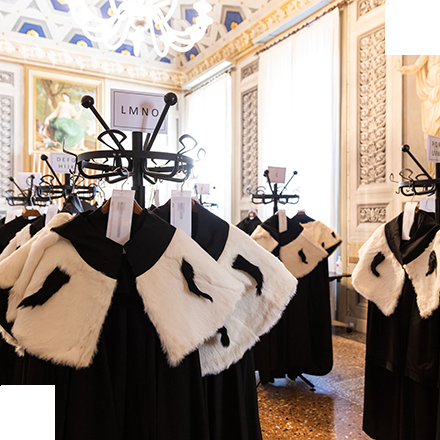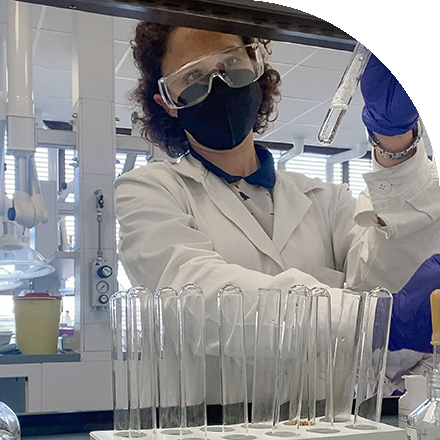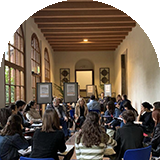Università Cattolica del Sacro Cuore Largo A. Gemelli, 1 - 20123 Milan
Concetta Lanciaux
LVHM Group Vice-Chairman until 2007
Dr. Lanciaux, in order to study at Cattolica you had to leave your family in Puglia and move to Milan. Why this choice?
It was a very difficult decision. But I had a strong desire to escape, to see other countries, other people. I was lucky. The parish priest of my village informed me of a competition for a scholarship at the Marianum. My father accompanied me to Milan. I won this competition with some of my dear friends like Luisa Muraro and Rosetta Infelise.
In which years did you attend the Catholic University and what do you remember about that period?
Between '60 and '64. Another friend, Mea Tabanelli, was also at the Marianum. Our meeting point with the Augustinianum students was the Magenta bar. It was a period of openness and preparation for the changes that would affect Europe in the following years. We attended Umberto Eco's lectures and everything that was modern and revolutionary. And we'd go by train to London to learn English and buy Pringle's cashmere sweaters.
Compared to when you were a student, what is missing at the University today or how have you improved?
I think that Università Cattolica has retained the ability to provide its students with a structuring basic education, as few other universities can do. It deserves to be better known internationally and to be more valued. Especially when compared to most European business schools . As useful as this type of training is, it produces managers with limitations. On the other hand, a mix of humanistic culture and managerial training, in the style of the Cattolica or the French École Normal, produces better managers, who combine entrepreneurial skills with a strategic and humanistic cultural vision. This is an indispensable formula if we want to take into account problems related to the environment, globalisation or multicultural aspects.
Is there a life lesson that you learned at Università Cattolica and that has accompanied you in the years that followed?
That you never have anything for nothing. At Cattolica we were completely immersed in our studies and were treated like adults preparing for the great leap in life. But first you had to acquire the ability to analyze and structure what you thought and said. It was the best way to form mature personalities who could successfully deal with any problem. Unfortunately, I have the impression that this style of education has been lost. All the more reason to be proud to have studied at the Catholic University.
Were there any professors who contributed more than others to your human and cultural growth?
I owe a lot to my aesthetics teacher Elisa Oberti. He took a personal interest in me and introduced me to this field of philosophy, which then had an important impact on my life. He was also best man at my wedding. Too bad he's lost track of it.
Did you maintain ties with the people who lived through those years with you? Who were the comrades who made the way?
Luisa Muraro continued to develop ideas that we were talking about in those years by publishing books and teaching. At that time, Romano Prodi was also at the Augstinianum. Recently I have reconnected with Marilu Floridia, who continued her teaching career in Milan, and with other classmates. I really appreciate these finds.
Of all that Cattolica passed on to you, how much did it then serve you for your subsequent activities?
I always thought that I had received an iron education, which allowed me to emerge when I went to continue my higher studies in the United States. Philosophy, philology, Latin and Greek have been the basis of all my work. Moreover, it was at Università Cattolica that, while studying aesthetics, I began to take an interest in the problem of creativity. And this is thanks to Professor Oberti's chair of Aesthetics. My interest in Umberto Eco and the film culture of the time also had a great influence: I became passionate about cinema and studied the editing techniques of Eisenstein, a famous Russian director. This background allows me to carry out the role I occupy today, which requires analytical skills and understanding of creativity. These are two very important aspects for LVMH.
How much has your training contributed to your managerial success?
Enormously. First of all, it developed my visual intelligence, which is essential for working in the luxury products sector. Humanistic culture is essential to always act productively without neglecting the principles that underlie aesthetics. The difference between luxury and mass products, in fact, is hedonism and cultural satisfaction.
Of the humanistic culture, what did you bring in particular to your managerial activity?
I wrote a book on the theory of creation in the Renaissance according to the humanists. It was my doctoral thesis, with which I deepened my studies at Cattolica. And I linked my classical studies to the theory of creativity, painting and cinema. From the Renaissance I have deduced a deep interest in man. I've always been more interested in people than things. For this reason, I chose a career in the field of human resources and business organization, which mainly concerns relationships between individuals. The success of a company depends on human skills and affinities.
Is it to take care of people that, after teaching, you started to be a manager?
At Carnegie Mellon University, where I taught for eight years, I was approached whenever there was a need to assemble new programs that involved setting goals and resources, organizing the team, and carrying out a project. There was a side to me that I wanted to realize. So I decided to pursue a master's degree in business administration for senior executives, the heads of companies who decide to renew their education. I was the first woman to be admitted, and at the end of my studies I was awarded as a Pioneer woman: the contact with those managers of large companies that made me leave university for private industry.
She is not the only Italian at the top of LVHM. There are also Toni Belloni, Marcello Bottoli, Pino Brusone and Gian Carlo di Risio. Is it causal, or do Italian managers have greater qualities?
They have interesting qualities because they come from a culture where luxury, creativity, fashion are historical values. From the Renaissance onwards, Italians have excelled in their creative skills. It was normal for us to use Italian managers when we designed the top management of the group.
LVHM is the world's leading luxury group. Don't you ever feel like you're dealing with ephemeral matters?
It depends on one's conception of our products. Luxury expresses the deepest and most authentic aspiration to dreams, beauty, nobility and aesthetics. It is an all-time constant. Recently I was in China, where I realized how some of our products, such as Vuitton and Dior or Dom Perignon champagne, are considered as the last remnants of a culture that has now disappeared.
At what stage is the project to create a luxury university to train the group's top managers?
The first courses have already been launched in London. And they received a special award from the Financial Times for the non-traditional pedagogical method that is adopted: "knowledge sharing", rather than traditional teaching.
What advice would you give to a college student to have a brilliant professional career?
Have big ambitions, apply yourself and follow your intuition without stopping. Tenacity is the mother of success.
What is your typical day?
It goes from simpler tasks such as answering emails or arranging a meeting to review the texts of the new website, to more complex things such as interviewing executives or designers for our group or conducting organizational analysis in our international subsidiaries. I have little time left for the public and professional activities that I carry out in any case.
Does your job force you to travel often?
80% of LVHM's turnover is generated abroad, so it's important to keep in touch with the subsidiaries. Traveling is an integral part of work.
What time does Italy spend?
Not enough for my taste.
Have you given up anything to become one of the thirty most influential women in Europe?
Rather, I have the impression that I have taken advantage of life. Working hard and successfully is a great satisfaction. And in addition, in my work I am inclined to take an interest in others, to discover talents, to find solutions. It doesn't get any more interesting than that.
How do you manage to reconcile work commitments with family affections?
With tenacity and will. I am very close to my family of origin and to the one I created with my husband. They know very well that they are my point of reference, a point without which I feel insecure. They are roots that give solidity, on which we must build without letting ourselves be blocked. I have always cared for and valued my family, but I have never let it stop me. And I tried to teach my son the same thing. He also works in my profession and has an intellectual background similar to mine, even though he was born in the United States and is American.
How do you spend your free time? What are your favorite hobbies?
My hobbies are reading and walking along the seafront. But I still have a great passion for cinema. I often see old films, because they are the mirror of the thoughts of their time. Right now, for example, I'm looking at the whole John Ford cycle. But I also like some of Hollywood's lighter films, like Pretty Woman. Of course, they are not masterpieces of cinematic art, but they say a lot about society.
Presenza, 2002 - Ne ha fatta di strada di Alessandro Galavotti






